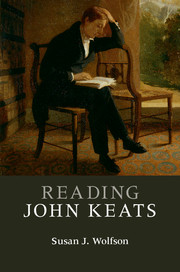Book contents
- Frontmatter
- Dedication
- Contents
- List of figures
- Preface
- Acknowledgments
- Note on the texts
- List of abbreviations
- 1 Life and times
- 2 Conceiving early poems, and Poems
- 3 Falling in and out of love with Endymion: A Poetic Romance; rereading King Lear
- 4 Venturing “new Romance”: Isabella; or, The Pot of Basil. A STORY FROM BOCCACCIO
- 5 Falling with Hyperion
- 6 Still Romancing: The Eve of St. Agnes; a dream-sonnet; Labelle dame
- 7 Reforming the sonnet and forming the Odes of spring 1819: Psyche; Nightingale; Grecian Urn; Melancholy; Indolence
- 8 Writhing, wreathing, writing Lamia
- 9 Falling in Fall 1819: The Fall of Hyperion and To Autumn
- 10 Late poems & lasting Keats
- A few famous formulations
- At a glance: Keats in context
- Notes
- Further reading
- Index
3 - Falling in and out of love with Endymion: A Poetic Romance; rereading King Lear
Published online by Cambridge University Press: 05 June 2015
- Frontmatter
- Dedication
- Contents
- List of figures
- Preface
- Acknowledgments
- Note on the texts
- List of abbreviations
- 1 Life and times
- 2 Conceiving early poems, and Poems
- 3 Falling in and out of love with Endymion: A Poetic Romance; rereading King Lear
- 4 Venturing “new Romance”: Isabella; or, The Pot of Basil. A STORY FROM BOCCACCIO
- 5 Falling with Hyperion
- 6 Still Romancing: The Eve of St. Agnes; a dream-sonnet; Labelle dame
- 7 Reforming the sonnet and forming the Odes of spring 1819: Psyche; Nightingale; Grecian Urn; Melancholy; Indolence
- 8 Writhing, wreathing, writing Lamia
- 9 Falling in Fall 1819: The Fall of Hyperion and To Autumn
- 10 Late poems & lasting Keats
- A few famous formulations
- At a glance: Keats in context
- Notes
- Further reading
- Index
Summary
Contest, test, trial
“I stood tip-toe” closes in a relay of mirrorings: a moon-enchanted poet conceives a moon-raptured shepherd conceiving a mythic shepherd (Endymion) beloved by a Moon-goddess. All are inspired poets, with Keats in the production-line. The worldly genesis of Endymion: A Poetic Romance (the longest poem he'd ever write, ever publish) was a compact made in spring 1817 with Hunt and Shelley to see who could finish a 4,000-line poem by the end of the year. With Poems just out, Keats was eager for a major project. He wrote through 1817, had proofs by the next winter, and a publication at the end of April 1818 – the only one of the three to succeed.
He was doubly energized: A Poetic Romance was not only a venture into a promising genre but also keyed to Keats's romance of being “a Poet.” “As to what you say about my being a Poet,” he wrote to George, and Bailey,
I have no right to talk until Endymion is finished – it will be a test a trial of my Powers of Imagination and chiefly of my invention which is a rare thing indeed – by which I must make 4000 Lines of one bare circumstance and fill them with Poetry … why endeavor after a long Poem? To which I should answer … a long Poem is a test of Invention which I take to be the Polar Star of Poetry … Did our great Poets ever write short Pieces? … I put on no Laurels till I shall have finished Endymion.
In vocation as well as theme – visionary imagination with an erotic vibe – Endymion would be a test of length and strength, a work of invention that would prove Keats's poetry to the world. In the “old tale” (4.786), a young man's dreams of a Moon-goddess end in his being “Ensky'd” (778) with her – its “felicity” (782) an embodiment of Keats's “favorite Speculation” to Bailey: “we shall enjoy ourselves here after by having what we call happiness on Earth repeated in a finer tone and so repeated” (K 70).
- Type
- Chapter
- Information
- Reading John Keats , pp. 33 - 49Publisher: Cambridge University PressPrint publication year: 2015

